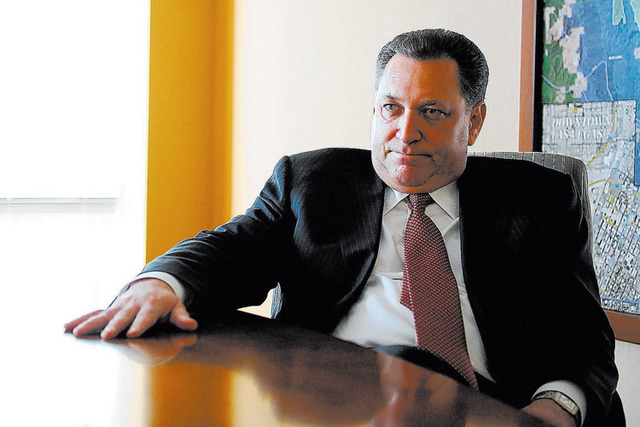Possible Boyd spinoff into REIT excites investors

It’s unclear if Boyd Gaming Corp. will ultimately spin off all or a portion of the company’s casinos into a real estate investment trust.
But the idea certainly piqued the interest of the investment community.
Shares of Boyd jumped almost 5 percent in value on the New York Stock Exchange last Friday, the day after the company said it spent $3 million on advisers to evaluate the idea of a REIT.
Analysts, however, were skeptical.
Several factors work against Boyd. The company’s ownership structure includes a more than 30 percent stake controlled by founder Bill Boyd and family members. Boyd also carries almost $3.5 billion in long-term debt.
Company officials brought up other impediments to a transaction, such as tax matters.
“This will not be a quick process,” Boyd Gaming CEO Keith Smith warned investors.
Working in the company’s favor are its 22 casinos in eight states, including nine in Southern Nevada. The real estate holdings have value.
“(The) initial research indicates it could be feasible,” Buckingham Research gaming analyst Brian McGill said. “However, the transaction would be very complex given the capital structure.”
By law, REITs don’t pay federal income taxes. With real estate as their primary source of income, REITs must distribute at least 90 percent of their taxable earnings to shareholders.
Last year, Penn National Gaming split off 21 of its 29 casinos and racetracks into Gaming and Leisure Properties, a publicly traded REIT. The properties are leased back to Penn through a management contract.
A similar REIT concept for Boyd surfaced in March when Elliot Associates, an activist New York-based hedge fund, acquired 5 percent of the company.
Analysts speculated Boyd might be pushed into the REIT.
“Keeping the REIT in play has been a supportive platform for regional stocks this year, despite the limited traction to date for Gaming and Leisure Partners in deals and equity performance,” Deutsche Bank Gaming analyst Carlo Santarelli said last week.
During Boyd Gaming’s third-quarter earnings conference call, Smith read from prepared remarks about the REIT process. He told analysts he wouldn’t answer questions about the topic.
That didn’t stop five of the first seven queries on the conference call to cover the REIT.
“I’m going to have to provide you my standard answer, which is that we’re not in a position to provide you any additional information other than what we gave in our prepared comments,” Smith said in response to one question on the process. “But thanks for the asking.”
Smith said in a later interview that Boyd didn’t change its stance on the REIT concept from the company’s original comments in the first and second quarters.
“We just added a few words,” Smith said.
But the language was enough to stir the pot.
Regional gaming rival Pinnacle Entertainment has been a subject of REIT speculation. Like Boyd, an activist hedge fund bought a stake in Pinnacle this year and proposed the idea.
At an investment forum in September, Pinnacle CEO Anthony Sanfilippo said the company hired advisers to help decide if a REIT made sense for shareholders.
“We are well into the process and a significant amount of work has been done and I would expect in the next couple of months that we will have a defined point of view,” Sanfilippo said.
Smith said Boyd Gaming would take its time to evaluate the REIT idea.
“While we still have extensive analysis to conduct, initial indications would suggest that forming a REIT is achievable and attractive under certain circumstances,” Smith said.
The investment community is willing to wait.
Macquarie Securities gaming analyst Chad Beynon said shares of Boyd and Pinnacle have jumped because the companies talk about the concept as being conceivable.
But he has doubts.
“We believe investors will flock to this idea in the near term as they have off and on since the Gaming and Leisure announcement,” Beynon said. “Management alluded to several obstacles that we have been highlighting over the past several months. We expect this to linger.”
McGill doesn’t see the REIT as realistic in the near term, given Boyd’s “leverage and ownership structure.”
During the conference call, Smith seemed to enjoy finding different ways to say “no comment.”
He told analysts that if Boyd begins moving away from a REIT process, investors will have their answer.
“I don’t think specifically we would say yes or no at any point in time, unless it became so obvious that we weren’t going to do it,” Smith said. “But I don’t think we can provide much more color at that point than at this point.”
Howard Stutz’s Inside Gaming column appears Wednesdays and Sundays. He can be reached at hstutz@reviewjournal.com or 702-477-3871. Follow on Twitter: @howardstutz.












